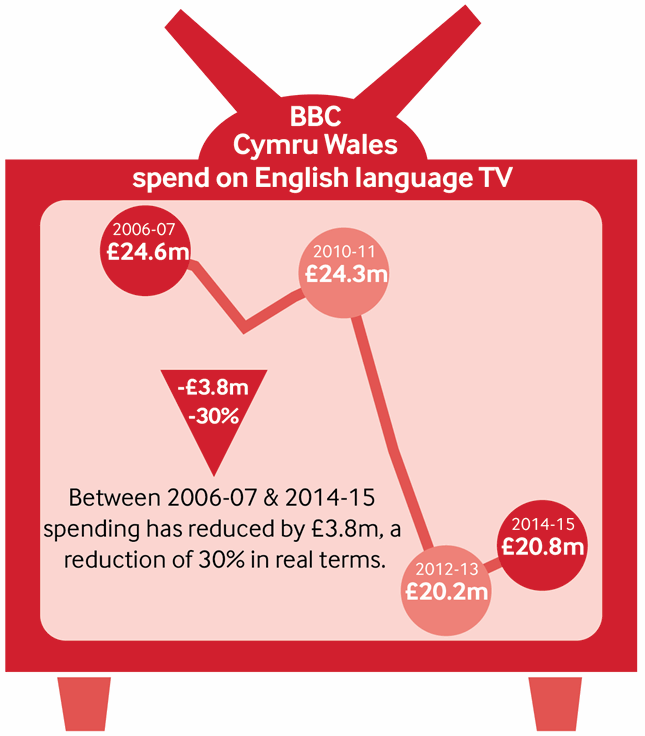This article is intended to inform and complement the Plenary debate scheduled for Tuesday 27 September 2016.
Last week the UK Government Department for Culture, Media and Sport published the Draft BBC Charter.
The BBC Charter is the constitutional basis of the BBC: it sets out in broad terms how the BBC should be organised and what it should do. These requirements are fleshed out in an Agreement between the BBC and the UK Government, a draft of which was published alongside the Draft Charter. The Draft Charter is set to run from 1 January 2017 to 31 December 2027.
Previous Assembly business: Does the BBC do enough for Wales?
Towards the end of the last Assembly, the Communities, Equality and Local Government Committee (CELG) conducted an inquiry into how the BBC Charter should reflect Welsh interests. Key concerns raised by the Committee included:
- Between 2006-7 and 2014-15 BBC Cymru Wales spend on English language TV output for Welsh audiences reduced from £24.6 million to £20.8 million: a reduction of about 30% in real terms.
- Since about 2006 BBC network spend has increased in Wales, to the extent that in 2014-15 Wales secured 7.8% – or £59.1 million – of UK BBC network television spend, greater than its 4.9% population share. The Committee shared stakeholders concerns that, welcome though this spend in Wales was, the network programmes made with it did little to address specifically Welsh issues.

The Committee made a number of suggestions as to how the BBC’s activities as they relate to Wales could be improved. These included:
- The Committee endorsed calls from the Welsh Government and the Institute of Welsh Affairs for the BBC to invest an extra £30 million into the services it provides for Wales.
- The BBC should decentralise its commissioning arrangements so that more big decisions are made in Wales.
- The BBC should set itself targets for Welsh portrayal in its network productions, and report on these annually.
The Committee’s concerns were clear: the BBC does not spend enough money on Welsh productions, or make enough distinctly Welsh programming.
Many of the Committee’s views have subsequently also been expressed in the following reports:
- Welsh Affairs Committee: Broadcasting in Wales (June 2016)
- A future for public service broadcasting: inquiry chaired by Lord Puttnam (June 2016)
To what extent are these concerns addressed by the Draft Charter and accompanying Draft Agreement?
The Draft Charter: does it address the Committee’s concerns?
Key points for Wales in the Draft Charter and Agreement include:
- A strengthened public purpose which states that the BBC must “reflect, represent and serve the diverse communities of all of the UK’s nations and regions and, in doing so, support the creative economy across the UK”.
- Accountability arrangements between the BBC, the Welsh Government and the National Assembly for Wales were established in a Memorandum of Understanding earlier this year. These have been re-affirmed in the Draft Charter, which states that the BBC must comply with requests to provide evidence or submit reports to Assembly committees in the same manner as they do committees of the Houses of Parliament. The Welsh Government must be consulted when the Charter is reviewed or renewed.
- The BBC’s annual plan, report and accounts must include details of provision for the UK’s nations and regions.
- The new BBC Board – which will govern the BBC – will have a non-executive director from Wales, whose appointment will be agreed between the UK and Welsh Governments.
- Ofcom has a new role in regulating the BBC, including ensuring that audiences in the individual nations are “well served”. Ofcom must “secure the provision of more distinctive output and services” on the BBC: which could be interpreted to mean more regionally and nationally distinct programme-making.
- As well as policing content, Ofcom will be responsible for ensuring that a “suitable proportion” of network programmes are made outside of London, including in each of the UK’s nations. Back in 2006 the BBC set itself the target of investing 17% of its overall network spend in the devolved nations, broadly in line with their combined population size: something it has exceeded in Wales. The UK Government intends for this minimum requirement not to be reduced.
These provisions suggest that the next Charter period could see more regionally and nationally distinct programming on the BBC, including that for Welsh audiences: depending on the extent to which these provisions are accompanied by money and action. However, BBC Wales recently announced that the organisation would need to save £9 million a year by 2022 to cope with the “cash flat” licence fee agreement. Rhodri Talfan Davies, BBC Wales Director, told staff that he hoped to limit savings in content areas to around £3 million over 5 years, whilst directing any new investment at English language television services. Mr Talfan Davies has previously indicated that the BBC management is receptive to requests from the Welsh Government and elsewhere for extra funding for BBC Wales, though how this receptiveness converts to extra money remains to be seen.
What about S4C?
Since 2013, the majority of S4C’s funding has come from the BBC licence fee. Prior to this, its funding came from the UK Government’s DCMS, which continues to provide a small grant. In 2011-12, S4C received £101 million from DCMS. In 2014-15, its budget reduced to around £82 million. The CELG Committee stated that the 36 per cent real terms funding reductions imposed on S4C since 2010 have been ‘both severe and disproportionate’. The BBC Draft Agreement states that S4C will receive £74.5 million from the licence fee annually until 2020-21.
The UK Government is planning a review of S4C in 2017, to consider its funding arrangements, remit and accountability.
The Welsh Government’s view
When giving evidence last week to the Assembly’s Culture, Welsh Language and Communications Committee, Minister for Lifelong Learning and the Welsh Language Alun Davies AM (who has responsibility for the Welsh Government’s broadcasting policy) noted the broad agreement between the Welsh Government and the CELG Committee’s work on the BBC Charter. He described the agreement between the BBC and S4C as “mature”, whilst stating that more funding for both the BBC and S4C would be welcome. He noted that he will be meeting the Secretary of State next week to discuss the draft Charter.
Presumably more details of the Welsh Government’s views will become clear on Tuesday 27 September, when the Assembly debates the Draft Charter in Plenary.
Article by Robin Wilkinson, National Assembly for Wales Research Service




